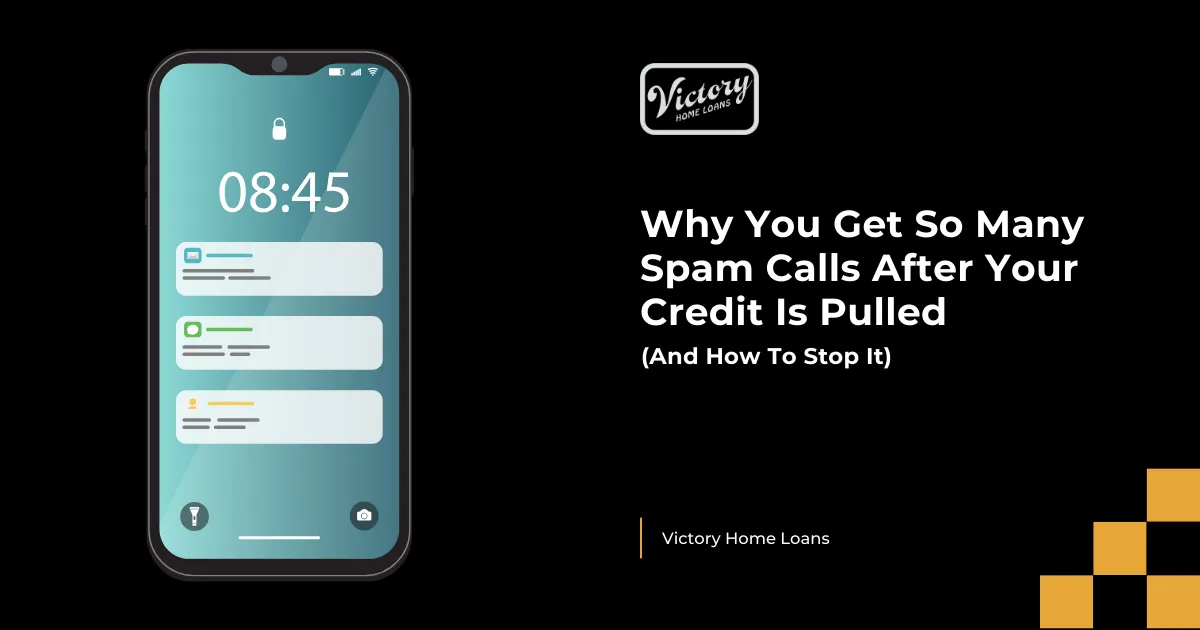Resources to Get You In a Home.

Why You Get So Many Calls When Your Credit is Pulled (and How to Stop Them)
If you've recently applied for a mortgage, car loan, or any type of credit, you’ve probably noticed an influx of unwanted calls, emails, and even junk mail. It's not just a coincidence—it’s a direct result of your credit being pulled. The moment a credit inquiry is made, especially for large purchases like a home, your information often becomes available to companies eager to offer competing products.
In this blog, we’ll explore why this happens and, more importantly, how you can put an end to it.
Why Do You Get So Many Calls and Emails After a Credit Pull?
When your credit is pulled for a mortgage or loan application, credit bureaus (like Experian, TransUnion, and Equifax) can sell your information to third-party companies through a practice called "trigger leads." These leads notify businesses that you’re actively seeking credit, making you a prime target for offers from lenders, insurance companies, and other financial services.
While the intention might be to offer you competing loan options or better deals, the result is often a bombardment of unsolicited calls, texts, and mail, creating more hassle than benefit.
How to Reduce the Amount of Calls and Spam You Receive
The good news is that there are ways to significantly reduce the number of calls and unwanted communications after a credit inquiry. Here's how:
1. Opt Out of Pre-Screened Offers
One of the best steps you can take to prevent your information from being shared is to opt out of pre-screened offers. The OptOutPrescreen.com website is a tool provided by the major credit bureaus that lets you remove your name from lists that they sell to businesses.
You can opt out for five years or choose the permanent option by mailing in a form. This should cut down on many of the unsolicited credit card offers, loan solicitations, and other marketing communications.
2. Register for the National Do Not Call Registry
To reduce telemarketing calls, register your number on the National Do Not Call Registry. While this won’t stop all unwanted calls, it will greatly reduce the number of legitimate companies that contact you for marketing purposes.
3. Use Call Blocking Apps
Even with the Do Not Call Registry in place, some unwanted calls will still slip through. Many smartphones have built-in call blocking features, but third-party apps can help block more spam calls. Popular apps like Nomorobo, Truecaller, and Hiya can identify and block spam numbers before they ever reach you.
4. Opt Out of Direct Mail Campaigns
Physical junk mail can pile up after your credit inquiry, too. By visiting DMAchoice, you can opt out of many marketing mailings for five years. This service, managed by the Data & Marketing Association, will help you cut down on the endless flow of credit card offers and other promotions landing in your mailbox.
5. Consider a Credit Freeze
If you’re not planning on applying for new credit in the near future, freezing your credit might be a smart move. A credit freeze prevents companies from accessing your credit report, meaning they won’t be able to generate offers based on your credit profile. To freeze your credit, you’ll need to contact each of the three major credit bureaus—Experian, Equifax, and TransUnion—and request the freeze.
Risks of a Credit Freeze
While freezing your credit is a great way to protect against identity theft and stop unsolicited credit offers, there are some potential drawbacks to consider:
Limited Access to New Credit: A credit freeze can make it harder for you to open new lines of credit quickly. If you decide to apply for a loan, a credit card, or even rent an apartment, you’ll need to temporarily lift the freeze, which can take a few days depending on the bureau.
Inconvenience: If you frequently shop for credit or apply for new services that require credit checks, the process of freezing and unfreezing your credit might become inconvenient. While unfreezing your credit is often straightforward, it adds an extra step whenever a legitimate company needs access to your credit report.
Impact on Non-Credit Services: Some services that require a credit check—such as signing up for utilities, applying for a job, or getting insurance quotes—may also be delayed or denied unless you lift the freeze, as these companies may need access to your credit report.
If you’re planning on using your credit soon or regularly need it for services, a credit freeze may not be the best option.
Take Control of Your Personal Information
While applying for credit might feel like opening the floodgates to endless spam, you have the power to limit it. By opting out of pre-screened offers, signing up for the Do Not Call Registry, and using spam-blocking apps, you can significantly reduce the noise.
It’s worth taking these steps to protect your peace of mind and keep your personal information out of the hands of marketers. If you’re tired of the constant calls and unwanted mail, a few minutes of effort today can save you a lot of frustration in the future.
By following these simple tips, you can keep your focus on what matters most—whether that’s closing on your dream home or managing your credit with less hassle. Stop the spam, and take control of your inbox and phone calls!
Resources:
This is the official website where consumers can opt out of pre-screened offers from credit bureaus for five years or permanently.
National Do Not Call Registry:
The Federal Trade Commission’s website where people can register their phone numbers to reduce telemarketing calls.
Managed by the Data & Marketing Association, this site allows users to opt out of junk mail and marketing solicitations for five years,.




Facebook
LinkedIn
Instagram